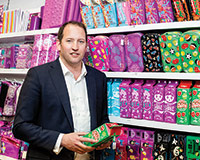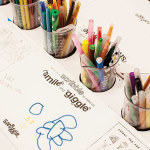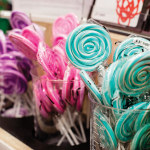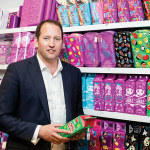The name is a mash-up of a smile and a giggle. And for Smiggle’s owner, the Melbourne-based Just Group, the smile produced by the success of its stationery brand aimed at the teenage market is megawatt.
Since arriving on these shores and opening its first shop in Westfield Stratford, owned by fellow Australian Westfield, in February 2014, the firm has tasted nothing but success, so much so that it plans on opening 40 Smiggle stores by Christmas. The ultimate plan is for 200 stores within five years, bucking the trend set by other retailers, which have been slashing units in recent years.
Despite the huge number involved, this is no rush job, says Josh Molloy, group general manager, property, at Just Group (pictured).
Standing in the 1,000 sq ft Smiggle store in Westfield London, Molloy’s 6ft 4in frame dominates his surroundings.
It is the week before schools start back after the summer holidays and the shop is crowded with children and flustered parents being persuaded by their offspring’s pleas to buy the highly prized, and highly priced, merchandise: pencil cases alone can cost up to £12.50.
It’s not just the parents who pay. Mintel’s 2014 report into the lifestyles of children and teens shows that 37% of teenagers’ pocket money is spent on accessories. As a result, Smiggle is doing a roaring trade. Molloy, gazing around the shop, simply calls it “an outstanding location”.
Just as the Smiggle merchandise does not compromise on price, the company also won’t compromise on sites. It looks for stores of between 800 and 1,000 sq ft gross with the help of UK agents MMX, and Harper Dennis Hobbs. High streets and shopping centres are on its target list, but only prime will be considered.
“We do a full review prior to coming into a market,” says Molloy, who, along with Just Group none-executive chairman Solomon Lew, looks personally at every site. Molloy makes the trip from Australia to the UK once every six weeks.
The long lead-in time explains why Smiggle, founded in 2003, launched in the UK only last year. “We do a lot of work upfront then we come in, put the hammer down and say, ‘We are going to go and launch.’ If we have 27 stores opening today, we would have reviewed and been to probably 60 cities in the UK.”
So carefully chosen are sites that Molloy looks surprised when asked whether he would close under-performing UK stores. “Could we what? Close stores? I can’t see that happening. We are happy with the way all the stores are trading at the moment.
“We don’t go down to isolating individual stores in terms of our most profitable. We have great stores throughout the country in terms of location. We are not unhappy with any of the trading performances. At the moment, the UK is our biggest growth business in terms of Smiggle as a brand.”
He adds: “If a site doesn’t meet our criteria, we just won’t look at doing it.
At the end of the day we are here to do business in the top schemes and top centres and top high streets in the country. We are not here to reinvent retail in the locations.”
Molloy is adamant there have not been any challenges opening in the UK, and he says Just Group is happy at how the UK has adopted Smiggle, and how the major landlords have reacted to the brand. “It has been fantastic. The newness that we bring to centres and schemes is great, and I think everyone benefits from it.”
Last month Just Group’s annual report stated: “The group remains confident that Smiggle UK will become a key profit-generator to the group, with 200 stores and sales of A$200m (£96m)-plus per annum within five years being achievable.” For the past five years average sales growth has been 27%.
While the UK is a major push for Just Group, Smiggle is still growing in its other markets. There are 800 stores in Australia, 23 in New Zealand, and 19 in Singapore. The US and the rest of Europe are also on the long-term target list.
Molloy says: “We are a retailer that likes executing really well in the markets we go to. So in the wider exploration, absolutely Europe, North America. We should be there at some point. But once again, it comes back to execution. And remember, we are only one-fifth into the journey of executing in the UK. The pipeline will take us five years to build.”
Despite Smiggle’s success in the Australasian markets, Molloy says the rest of Just Group’s brands will not be joining Smiggle in the UK. “We have a lot of product developers and merchants that know Australia and New Zealand really well. They know about the differences between Brisbane and Victoria. They are aware that on the same day it could be 5°C in one city and 35°C in the other. Our fashion lines are very good at catering for that.
“But are we good at telling people in London what they should be wearing on a Tuesday in the middle of winter when it’s 35°C in Brisbane? I’m not sure any retail business is ultimately going to be good at that.”
Leaving the Westfield London shop, Molloy weaves carefully to avoid the overexcited customers. As a final comment on the future of Smiggle, he adds: “Our focus today is to become a UK business and execute well in the UK, and we are going to be here for the next 40 to 50 years. We have no interest in selling the business off.”
With such a success story and the obvious desire for all things Smiggle, success seems almost guaranteed.
The Smiggle appeal
Founded in Melbourne, Australia, by Stephen Meurs and Peter Pausewang in 2003, Smiggle quickly built a following for its brightly coloured, quirky stationery, bags, lunchboxes, accessories, and gadgets.
In 2007 it was bought by Just Group.
The secret to its success was having a limited product line in the key colours of purple, blue, pink, green, white, black and orange.
The same items are launched simultaneously in every Smiggle store across the entire portfolio. Once that line is sold out, it is gone forever, making each item highly prized.
Tinc-ering
Smiggle’s closest rival in terms of similar merchandise in the UK is Tinc. Having opened the first shop in Bath in April 2011 the company, also trading as Blott, has 29 stores and concessions.
Like Smiggle, Tinc bases its stationery range on five core colours: blue, pink, green, black and white, and also has a limited range with special edition colours. Its most expensive pencil case costs £10.














